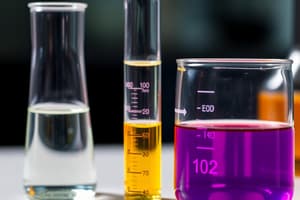Podcast
Questions and Answers
What is the unit of measurement for expressing the quantity of a solute?
What is the unit of measurement for expressing the quantity of a solute?
- Mole
- Equivalent-gramme (correct)
- Gramme-mole
- Mole-gramme
What is a solution composed of?
What is a solution composed of?
- Solute and a product
- Solute and a solvent (correct)
- Solute and a reactant
- Solute and a catalyst
What is the term for the amount of solute per unit volume of solution?
What is the term for the amount of solute per unit volume of solution?
- Molality
- Concentration (correct)
- Molarity
- Normality
What is the term for the number of moles of solute per unit volume of solution?
What is the term for the number of moles of solute per unit volume of solution?
What is the term for the amount of solute per unit mass of solution?
What is the term for the amount of solute per unit mass of solution?
What is the term for the number of equivalent-grammes of solute per unit volume of solution?
What is the term for the number of equivalent-grammes of solute per unit volume of solution?
What is the term for the constituent in excess in a solution?
What is the term for the constituent in excess in a solution?
What is the definition of a solution?
What is the definition of a solution?
What type of solution has a solid solvent and solid solute?
What type of solution has a solid solvent and solid solute?
What is an example of a solid solution?
What is an example of a solid solution?
What is the term for the substance in a solution that is present in a small amount?
What is the term for the substance in a solution that is present in a small amount?
What type of solution has a liquid solvent?
What type of solution has a liquid solvent?
What is the result of the interaction between the solvent and solute in a solution?
What is the result of the interaction between the solvent and solute in a solution?
What type of reaction occurs when a solute dissociates into ions in a solution?
What type of reaction occurs when a solute dissociates into ions in a solution?
What is the term used to describe the ability of a solvent to dissociate solutes into ions?
What is the term used to describe the ability of a solvent to dissociate solutes into ions?
How can the dielectric constant of a solvent be used to determine its dissociation power?
How can the dielectric constant of a solvent be used to determine its dissociation power?
What is the significance of a dielectric constant value greater than 40?
What is the significance of a dielectric constant value greater than 40?
What is the effect of the dielectric constant on electrostatic interactions between ions of opposite charges?
What is the effect of the dielectric constant on electrostatic interactions between ions of opposite charges?
Flashcards are hidden until you start studying
Study Notes
Solution Definition
- A solution is a homogeneous mixture (liquid, solid, or gas) formed by one or more solutes dissolved in a solvent.
- Solvent: the component in excess.
- Solutes: the element(s) in small proportion.
Solvent-Solute Interaction
- Ionization: interaction between solute and solvent resulting in the modification of the dissolved molecule's structure with the appearance of polarity.
- Solvolyse (hydrolysis): dispersion by rupture of the bond caused by solvent molecules.
Classification of Solvents
- Solvents can be classified into two categories: dissociating solvents and non-dissociating solvents.
- The dissociating power of a solvent can be assessed using physical criteria, such as the dielectric constant (Σ).
- The dielectric constant expresses the solvent's ability to decrease electrostatic interactions between ions with opposite charges.
Preparation of Liquid Solutions
- Two techniques are used to prepare a titrated solution: gravimetry (method by weighing) and volumetry (method by dilution).
Quantitative Aspect of Solutions
- The quantity of solute can be expressed in terms of mass, volume, unit of matter (mole), or equivalent-gram.
Expressions of Concentration
Teneur (Concentration)
- Teneur (concentration) of a solute X in a solution is the quantity of that solute relative to a given quantity of solution, taken as a reference.
Volumetric Concentration
- Concentration in mass per unit volume of solution (g/L).
- Molarity (M): number of moles per unit volume of solution (mole/L).
- Normality (N): number of equivalent-grams per unit volume of solution (Eq/L).
- Percentage volume/volume: milliliters per hundred milliliters (% v/v).
Mass Concentration
- Concentration in grams per kilogram: titre (g/kg).
- Molality: concentration in moles per kilogram (mole/kg).
- Percentage mass/mass: percentage (% m/m).
- Concentration in milligrams per kilogram: parts per million (ppm).
- Concentration in micrograms per kilogram: parts per billion (ppb).
Studying That Suits You
Use AI to generate personalized quizzes and flashcards to suit your learning preferences.




